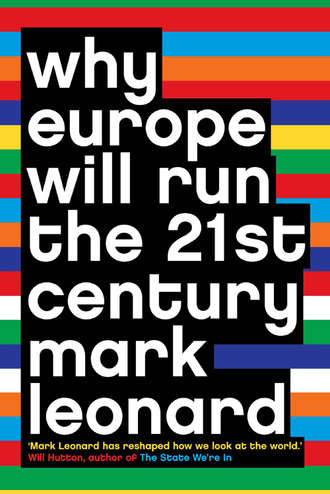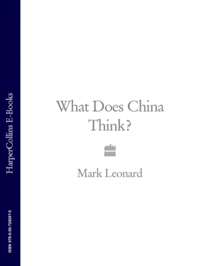
Полная версия
Why Europe Will Run the 21st Century
This success was a direct result of Europe’s structure. While the US administration was pursuing its policy of divide and rule – and talking separately to each of the Hydra’s heads – the European heads were busy watching each other and adapting their positions accordingly. There was certainly no ‘grand plan’ behind the approach of individual countries and, as the crisis reached its apotheosis, there was very little dialogue between the competing camps; but the actions of each European government were carried out in the knowledge of what the other camps were doing. The French and Germans could only afford to take a very aggressive approach because they knew that the ‘New Europe’ led by Blair, Aznar, Miller, and Berlusconi would stay on good terms with Bush. Equally, Tony Blair knew that, however far he went to support American action, it was likely that this would be a one-off that would not be repeated in Iran or Syria because of the depth of opposition in France and Germany. The fact that the European powers had such a strong consensus on the strategic goals – of Atlanticism, support for international law, and opposition to unilateral preventive war – meant that without any formal attempt to co-ordinate their positions, it was likely that these principles would shine through.
The European Union does not just have a ‘good cop’ and a ‘bad cop’: it is like an entire police force of good and bad cops. Other countries will always be able to find someone in the European system who is more sympathetic to their cause, and this will tend to draw them into a process of negotiation from which it is often hard to escape. The ‘good cops’ will then often hide behind the ‘bad cops’ in the EU system and manage to extract concessions. For example, British and Nordic enthusiasm for enlargement to the East allowed the countries of Central and Eastern Europe to ‘keep faith’ as they embarked on painful processes of internal reform. At the same time, French doubts allowed the European Commission to exact concessions from them in the protracted negotiations for accession. The key feature of this ‘good cop, bad cop’ dynamic is that, even though the disagreements are genuine, the core objectives of all European countries tend to be the same: a commitment to multilateral action; democracy, human rights and the international rule of law; negotiation and engagement rather than military force. Therefore, countries that seek to play Europeans off against each other tend to get pulled back to these basic principles.
However, in spite of all this success, many Euro-enthusiasts are not advocates for ‘Network Europe’. Even those who concede that the network works well for economic policy, because like Visa it gives its members access to economies of scale without removing the competition that drives innovation, will say it is hopeless for foreign policy. But as we have seen, the development of ‘Network Europe’ has paradoxically allowed the EU to become a global power to be reckoned with, not just ending the balance of power in its own backyard, but reversing it.
Our ‘Network Europe’ has not come about as a result of a conscious plan. It is the product of an uneasy truce between the traditional visions of a European superstate and a European free-trade area – but no single vision has managed to achieve unanimous support. And it never will. As Europe develops in the future, we must embrace its unique structure, and reform it to make it work to our advantage.
Of course, we need to get better at managing the divisions within Europe. The wounds inflicted by the Iraqi disagreements run deep, and Europe cannot afford to rip itself apart every time a major international issue arises. One lesson from the Iraq war is that Europeans can have greater influence if they develop a common position before a crisis erupts, as they have done towards Iran. However, we must recognize that the persistence of different views is a strength rather than a weakness, and that the EU’s structure is robust enough to accommodate disagreements of monumental proportions. Samuel Beckett said that if at first you don’t succeed ‘Fail, fail again, fail better’. The genius of Europe is that it carries on trying. And from every setback it has emerged stronger.
CHAPTER 3 Europe’s Weapon is the Law
The bland features of Hans Blix became an unlikely fixture on our television screens and in our newspapers in early 2003. With his weapons inspections, this softly spoken balding former diplomat became the personification of hope and peace. The other familiar figure in those tense few months was Donald Rumsfeld, the ebullient American Secretary of Defense. The former wrestling champion also promised to destroy the Iraqi will to fight: not by relying on inspections, but using ‘shock and awe’ to scare Iraqis into submission.
The conflict went beyond the situation in Iraq. The two men became archetypes for different worldviews: the pyrotechnic might of the United States military was the perfect foil to the United Nation’s preference for inspections. One offered to contain the Iraqis by spectacular displays of power, the other by keeping them under constant surveillance.
Unfortunately, spectacle and surveillance were just two sides of the same impotence, because both attempted to control Iraq from the outside. Unlike Europe’s transformative power, which changes countries permanently, this kind of power lasts only as long as there is a crisis and huge amounts of international pressure and resources. As soon as the media and the political circus move on, the problems return.
The Bush Administration has used the crisis in Iraq to show that Europe’s obsession with international law is a sign of its terminal weakness. It depicts it as a modern-day Prometheus bound up in red tape, at the mercy of devouring predators. But what was it that transformed Europe from being an incubator for world wars into a transmission belt for peace and democracy? The simple answer is: international law. The law is Europe’s weapon of choice in its campaign to re-shape the world.
Power as Spectacle
Machiavelli famously said that it is better to be feared than to be loved. But he also warned that it is vital not to be hated. Donald Rumsfeld ignored the second part of this injunction when he ordered the Pentagon to implement the principle of ‘Shock and Awe’. The report by the National Defense University, which coined the term, called for displays of firepower so dramatic that they would sap America’s enemies’ will to fight in the same way that the nuclear bomb had worked on Japanese fighters in Hiroshima and Nagasaki in the Second World War.1 In an age of terror, Rumsfeld and his colleagues were looking to turn the tables on their enemies. They would use violence not to achieve specific objectives such as conquering a town or destroying a weapons factory, but as an end in itself: an instrument to enforce discipline on ‘tyrants and terrorists’ around the world.
This was part of a broader strategy to respond to a post-9/11 world in which terrorists could procure weapons of mass destruction from ‘rogue states’. Pre-emptive strikes were intended to help restore the viability of deterrence – by making it clear that the USA would severely punish any state that considered sharing destructive technologies with terrorists. By making an example of Iraq, Rumsfeld hoped to be able to send a message to Iran, Syria, North Korea, and any other country thinking of equipping itself with weapons of mass destruction.
Using brute force to convey a message is not new. But now this idea of ‘power as spectacle’ can be perfected with the technology of the twenty-first century: ‘daisy cutters’, ‘bunker-busting’ nuclear bombs, squadrons of F16s, and the like. The problem with expressive violence is that its effects soon wear off. Rulers in the past found that they needed to up the ante with ever more gruesome executions and other displays of might, such as the gut-wrenching execution of Robert-François Damiens, who was ripped apart by four galloping horses for attempting to kill Louis XV of France in 1757. And even if fear can be maintained, it becomes increasingly expensive and ultimately counter-productive as it creates resentment among the very people it is seeking to control.
That is what has happened with Iraq. There were almost monthly displays of firepower between 1991 and 2003 to keep the regime on its toes. When this was felt to be failing, the logic of the allies’ position compelled them to invade in 2003. The initial effect was successful. Saddam was removed, and Iran, Syria and Libya were initially cowed by the brute force of the invasion. But soon the effects wore off. Already the regimes in Tehran and Damascus feel emboldened by the fact that 130,000 US troops are bogged down in Iraq. And as the continued presence of foreign forces acts as a magnet for insurgency, the Syrian and Iranian regimes look on with relief at the transformation of a potentially popular war of liberation into an unpopular and bloody occupation.
However, the fatal flaw of ‘power as spectacle’ is that it is essentially destructive. It can stop people doing bad things, but it is not a good way to build and govern a complex society. In Afghanistan the allied invasion had no trouble removing the Taliban regime, but the allies failed to rebuild Afghanistan from the roots up. In spite of a veneer of democracy, the underlying realities of rule by warlords, corruption, and nepotism remain the same. As one American soldier wryly put it: ‘We thought we had bought the Northern Alliance, but it turns out that we had rented them.’ Once the superpower’s attention had been diverted by the war in Iraq, its power to transform the Afghan Republic began to wane.
This kind of power is inefficient because it is always imposed on unwilling subjects from outside, rather than changing the wiring of society from the inside. This is what led modern societies to move from ‘power as spectacle’ towards ‘power as surveillance’.
Power as Surveillance
The French philosopher Michel Foucault showed how, from the nineteenth century, advanced societies moved from relying largely on the deterrence of visible expressions of might to discipline enforced by making potential subjects of power visible, through regulation, official papers, CCTV and prisons. Foucault argues that the shift from spectacle to surveillance allowed modern societies to be policed at a fraction of the cost of the ‘Ancien Régime’. The key was finding ways to record and monitor the behaviour of citizens in a systematic way through the development of timetables, identity cards, photographs, medical records, and laws.
The United Nation’s weapons inspections were developed because military power is expensive and short-lived in its effects. By getting the international community to insist that Iraq complied with treaties that Saddam himself had signed, the UN felt that it would have the legitimacy to change Iraq. And by sending Hans Blix and Mohammed Al Baradei to triple-check every single Iraqi claim, they knew they would not have to take Saddam at his word. Weapons inspections are the direct opposite of power as spectacle: it is not the strength of Blix and his team that needs to be on show, but the behaviour of the Iraq regime and sites they are inspecting. This was power as surveillance.
Конец ознакомительного фрагмента.
Текст предоставлен ООО «ЛитРес».
Прочитайте эту книгу целиком, купив полную легальную версию на ЛитРес.
Безопасно оплатить книгу можно банковской картой Visa, MasterCard, Maestro, со счета мобильного телефона, с платежного терминала, в салоне МТС или Связной, через PayPal, WebMoney, Яндекс.Деньги, QIWI Кошелек, бонусными картами или другим удобным Вам способом.



